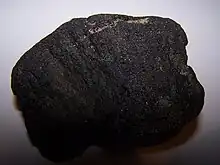meteorwrong
English
WOTD – 13 August 2019
Etymology

A meteorwrong – a rock resembling a meteorite which was found on a beach in Brittany, France, using a metal detector
Coined by replacing the final syllable of meteorite, which sounds like right, with wrong.
Pronunciation
- (Received Pronunciation) IPA(key): /ˈmiː.tɪ.ə.ɹɒŋ/
Audio (RP) (file) - (General American) IPA(key): /ˈmi.ti.əˌɹɑŋ/, /-ɾi-/, /-ɹɔŋ/
- Hyphenation: me‧te‧or‧wrong
Noun
meteorwrong (plural meteorwrongs)
- (humorous) A rock that is believed to be a meteorite, but is in fact terrestrial in origin; a pseudometeorite. [from 20th c.]
- 1964, The Griffith Observer, volume 28, Los Angeles, Calif.: Griffith Observatory, →ISSN, →OCLC, page 40, column 1:
- A scarlet precipitate (C8H14N4O4Ni) will be present if nickel is present. A negative test for nickel means you have a "meteorwrong." A positive test may indicate you have a meteorite, but since there are many commercial nickel-iron alloys it is not a conclusive test.
- 1969, Lincoln LaPaz, Topics in Meteoritics: Hunting Meteorites: Their Recovery, Use, and Abuse from Paleolithic to Present (University of New Mexico Publications in Meteoritics; 6), Albuquerque, N.M.: University of New Mexico Press, →OCLC, page 171:
- Unfortunately, the object turned out to be only a “meteorwrong”—although a deceptive one.
- 2008, O. Richard Norton, Lawrence A. Chitwood, “A Gallery of Meteorwrongs”, in Field Guide to Meteors and Meteorites, London: Springer-Verlag, , →ISBN, page 175:
- Vastly more meteorwrongs are found than meteorites. This should be no surprise. A host of Earth objects—natural and manmade—do indeed look like meteorites, and they are just waiting to be found and to confuse you.
- 2010, Mike [Michael] D. Reynolds, “Meteorite Classification”, in Falling Stars: A Guide to Meteors and Meteorites, 2nd revised and updated edition, Mechanicsburg, Pa.: Stackpole Books, →ISBN, page 63:
- Those who work in the field looking for meteorites keep a magnet with them at all times. This is always the first test; if the meteorite suspect is not magnetic, it is a "meteorwrong." Good collectors learn very quickly how to identify meteorwrongs since what may be represented as a very rare stone meteorite (at $200 a gram!) could turn out to be an expensive piece of junk. The classic meteorwrong is an igneous rock known as a Cumberlandite.
Translations
rock believed to be a meteorite — see pseudometeorite
This article is issued from Wiktionary. The text is licensed under Creative Commons - Attribution - Sharealike. Additional terms may apply for the media files.